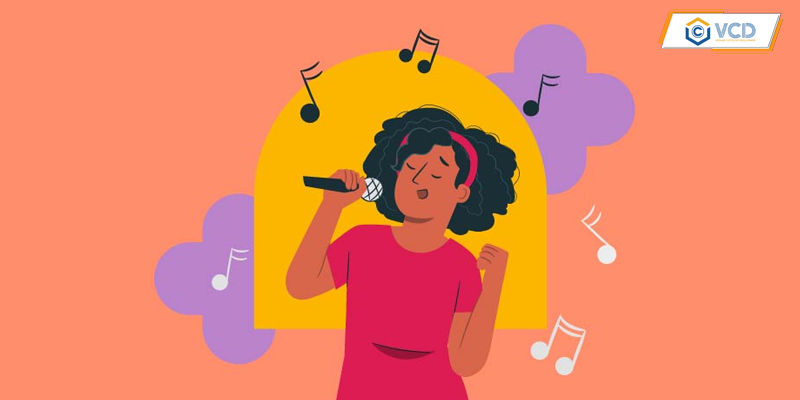Does covering a song require permission?
The trend of cover singing (re-singing a song in many forms) is increasingly popular in Vietnamese showbiz. It can turn an unknown singer into a “goddess” or “god” of covers on YouTube, but it can also turn around and slander the singer’s name, denouncing the singer’s range and talent. Covering popular or already famous songs is not a bad thing. Behind the covers of all styles and constantly appearing on websites are sad stories, that reveal many limitations. that not everyone can notice. So the question is, do cover songs require permission? Please follow VCD’s article below.
1. What is a song cover?
The cover song is a term used to talk about a musical product, a song that is remade or re-written from a previously sung and recorded song. There have been many people with singing ability who have covered famous songs by other artists and received positive responses from the online community as well as music fans.
Covering a song is understood as re-singing a previously available song that was commercially released or a famous song.
Covering a song means that the cover will use the beat of the original song and sing it over that music. Or for the cover person, they can add keyboard and piano skills to transform the song according to their style.
2. Does covering a song require permission?
Cover songs are considered derivative works of the original work or public performance.
Musical works are a type of work protected by copyright according to Point d, Clause 1, Article 14 of the Intellectual Property Law.
According to Point B, Clause 1, Article 20 of the Intellectual Property Law and Clause 1, Article 21 of Decree 22/2018/ND-CP regulating copyright property rights: The act of covering another person’s song without permission is the act of infringing on copyright and the right to perform works in public.
According to Clause 3, Article 20 of the Intellectual Property Law, it can be concluded that covering another person’s song without permission is an infringement of copyright and the right to perform the work in public. Covering other people’s songs requires permission and payment of royalties, remuneration, and other material benefits to the copyright owner.
However, covering other people’s songs in the following cases does not require permission, does not require payment of royalties, or does not require permission but must pay royalties:
– Cases where permission is not required and royalties are not paid according to Clause 1, Article 25 of the Intellectual Property Law:
+ Self-copy a copy for personal scientific research and teaching purposes.
+ Reasonably cite the work without distorting the author’s intention to comment or illustrate in your work.
+ Cite works without misrepresenting the author’s intention to write articles and use them in periodicals, radio and television programs, and documentary films.
+ Cite works to teach in schools without distorting the author’s intention and not for commercial purposes.
+ Copy works to store in the library for research purposes.
+ Performing theatrical works and other artistic performances in cultural and propaganda activities without collecting money in any form.
+ Recording and recording live performances for current news or teaching purposes.
+ Taking photos and broadcasting works of art, architecture, photography, and applied arts displayed in public places to introduce the image of that work.
+ Convert the work into Braille or another language for the visually impaired.
+ Import copies of works for others to use privately.
– Cases where permission is not required but royalties must be paid according to Clause 1, Article 26 of the Intellectual Property Law:
+ Broadcasting organizations that use published works for broadcasting with sponsorship, advertising, or collecting money in any form do not have to ask for permission but must pay royalties and remuneration to the copyright owner. fake since use.
+ Broadcasting organizations that use published works to broadcast without sponsorship, advertising, or collecting money in any form do not have to ask for permission but must pay royalties and remuneration to the owner copyright from the time of use according to Government regulations
From the above regulations, when covering other people’s songs to post on social networking platforms in general, it is necessary to apply for permission and pay royalties and remuneration to the copyright owner.

3. Penalties for covering songs without permission
For acts of covering songs without the consent of the copyright owner, they can be punished as follows according to Clause 2, Article 2, Article 13 of Decree 131/2013/ND-CP:
– A fine from 5,000,000 VND to 10,000,000 VND shall be imposed for directly performing a work in public without the permission of the copyright owner according to regulations.
– A fine from 10,000,000 VND to 15,000,000 VND shall be imposed for performing works through audio or video recording programs or any other technical means that the public can access without permission. Permission from the copyright owner according to regulations. Apply remedial measures to force the removal of copies of infringing audio and video recordings.
The above is the administrative fine for individuals. If an organization commits a similar violation, the fine will be double that of an individual.
In conclusion, the act of covering a song without permission or payment can be subject to an administrative fine of up to 30 million VND. However, in reality, with a hot song covered on YouTube, the income can be greater than this number. In addition, using or requesting to handle copyright infringement in Vietnam is not enough of a deterrent, so VCD advises work owners to pay more attention to protecting their rights by registering copyright to have a basis for evidence in court.
